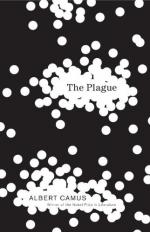|
|
The Plague Topic Tracking: Exile
Part 1
Exile 1: The hotel in Oran is a collection site for people like Rambert and Tarrou, who are in the town as foreigners, exiles from another place.
Exile 2: When the town gates are shut, its citizens are all exiled together, quarantined from the outside world.
Part 2
Exile 3: The quotation on page 67 directly refers to this time of plague as a "long period of exile."
Exile 4: The psychological state of exile is fully defined by the narrator: it is to live detached from the past--with a "memory that serves no purpose," and devoid of hope for the future. An exile lives like a prisoner, only his mind is the prison.
Exile 5: The feeling of exile is such a desperate emotion that some people are willing to risk being shot in an attempt to escape the forced exile imposed upon them by the locked city gates.
Part 3
Exile 6: In Part 3 there is much focus on how at this point, the people of Oran are all exiled together.
Part 4
Exile 7: The experience of exile is heightened in the plague-ridden town because the townspeople, paranoid about catching the disease, are afraid to get close to each other.
Exile 8: Rambert, one of the most exiled characters, realizes that the plague is not just a source of isolation--it has also made him feel more of a member of the town. Now he feels he must stay and fight the disease.
Exile 9: Those in the quarantine camp display typical behavior of exiles--they are uninterested in most everything and their minds are elsewhere, as if on a forced vacation.
Part 5
Exile 10: The exile of the townspeople is over when they again have their living, breathing loved ones around them.
Exile 11: At the chronicle's conclusion, Dr. Rieux says that "love, exile and suffering" were what everyone shared in Oran during the plague.




